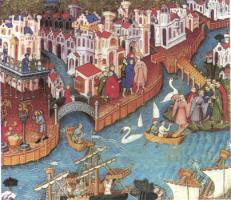 |
| Venice, XIIIth c. |
|
|
 et's go a few years before the begining
of the trip. In the XIIIth century, after the fourth crusade and fall of Constantinople in 1204
(today Istambul), Venice has aquired new privileges on the bysantum capital.
The treaty concluded with the Francs, gave it the three quarters of the city's treasure.
It is then a rich and important place for the spices, silk and invaluable stones trade. et's go a few years before the begining
of the trip. In the XIIIth century, after the fourth crusade and fall of Constantinople in 1204
(today Istambul), Venice has aquired new privileges on the bysantum capital.
The treaty concluded with the Francs, gave it the three quarters of the city's treasure.
It is then a rich and important place for the spices, silk and invaluable stones trade.
|
* * *
 iccolo Polo et Matteo Polo are then venetian traders
with important counters in Constantinople and Crimea. They had one too on Curzola's island
(History of the island).
They quit Venice in 1253. Marco Polo will be educated by his mother
and his grand-father. They go first by boat, using the Adriatic Sea. They go round Greece, and join the
Black Sea, crossing Constantinople. In 1260, they arrived in Sudak, a fishing port from Crimea, and meet
Marco Polo il vecchio (the Elder) in Soldaia, and the go to Suray on the Volga rivers. They trade there during one year
to sell their merchandises, precisely their invaluable stones. iccolo Polo et Matteo Polo are then venetian traders
with important counters in Constantinople and Crimea. They had one too on Curzola's island
(History of the island).
They quit Venice in 1253. Marco Polo will be educated by his mother
and his grand-father. They go first by boat, using the Adriatic Sea. They go round Greece, and join the
Black Sea, crossing Constantinople. In 1260, they arrived in Sudak, a fishing port from Crimea, and meet
Marco Polo il vecchio (the Elder) in Soldaia, and the go to Suray on the Volga rivers. They trade there during one year
to sell their merchandises, precisely their invaluable stones.
* * *
 nce
the trade concluded, at the same time, a civil war started between two local mongolian chiefs
Barka, Lord of the Golden Horde and his cousin Hulagu, Kan of the
Tatars. The same year, a new war started in Constantinople, becoming then Genovese. In 1261, the two
brothers couldn't going back by the same way, they look for a commercial way to the east, passing
by the north of the Caspian Sea. nce
the trade concluded, at the same time, a civil war started between two local mongolian chiefs
Barka, Lord of the Golden Horde and his cousin Hulagu, Kan of the
Tatars. The same year, a new war started in Constantinople, becoming then Genovese. In 1261, the two
brothers couldn't going back by the same way, they look for a commercial way to the east, passing
by the north of the Caspian Sea.
* * *
 hey reach after 17 days thru the
desert (unchanged from millions of years, it came from the desert! ) and arrived in Bukara
in Persia (today Uzbekistan), one of the most important city of the Silk Road.
And trying to escape the war, they stay blocked there three years. Hulagu won the
war, his ambasador remarked the Polo brothers. hey reach after 17 days thru the
desert (unchanged from millions of years, it came from the desert! ) and arrived in Bukara
in Persia (today Uzbekistan), one of the most important city of the Silk Road.
And trying to escape the war, they stay blocked there three years. Hulagu won the
war, his ambasador remarked the Polo brothers.
History continues here |

